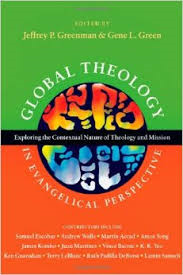Excerpted from Global Theology in Evangelical Perspective,
eds. Greenman and Green, IVP 2012.
“African Theology” by James Kombo
“African theology appreciates Africa and its dynamics as
well as the yawning gap between the continent and the Bible in its historical
and cultural setting. African theology has attempted to bridge this gap by …4
dominant patterns of conversation:
1. Identity theology based on African primal religions and African philosophy. The debate is whether pre-Christian Africa had a sense of God. Some scholars have concluded that “the God of the Bible was the same God known to Africans by various names” (p.135).
2.
Incarnation/Translation Theology – i.e., “transposing
the Bible into respective contemporary indigenous languages” (p. 134). “Our theologizing process must
recognize African cosmology” and specifically “identify and employ those
African primordial narratives or categories of reality already available” (p. 138).
3.
African/World Christian theology. “Africa embraced
Christianity because it resonated so well with the values of the old
religions…People sensed in their hearts that Jesus did not mock their respect
for the sacred or their clamor for the invincible Savior, so they beat their
sacred drums for him…Christianity helped Africans to become renewed Africans,
not remade Europeans” (p. 139). “The numerical and ethnic shift in global
Christianity to the global South and to Africa in particular…creates space for
African theology in the global arena” (p. 140).
4.
Contextual Theologies – i.e., African inculturation
theology, African black theology (“the gospel has a political dimension and
could only be relevant to the extent that it centered on justice, liberation
and a preferential option for the poor”), African liberation theology (which “exposes
and corrects the causes of poverty, political oppression, disease and ignorance”),
and African women theology (concentrating on “Christology and forms of church
life such as constitutions of churches, liturgies, catechesis and moral options
[so that] women’s issues are paramount and classical church divisions are
rendered irrelevant” (pp.140-144).
Two of the challenges ahead are (1) “to maintain a candid and
vibrant conversation between the good news of Jesus Christ and Africa’s current
multidimensional challenges and opportunities. Note that evangelicals have been
seen as aloof, preferring to carry only the message of the good news. And (2) to
encourage and prepare [African] leadership enabled to answers questions
emerging from the African grassroots” (p.146)
“African American Theology, Retrospect and Prospect” by
Vincent Bacote
“Black liberation theology originated on July 31, 1966 when
51 black pastors bought a full page ad in the New York Time and demanded a more
aggressive approach to eradicating racism. They echoed the demands of the black
power movement but the new crusade found its source of inspiration in the
Bible” (p.211). “It emerged as an attempt to answer the
questions:
1. How
can a person be Christian and also committed to addressing the oppressive
legacy of racism in the United States?
2. How
can you have a gospel that is not only about going to heaven but also about
being concerned with justice and peace in the present?
3. Can
you have a Christian faith that changes the way black people see themselves?” (p. 212).
Quoting James Cone: “The blackness of my theological
consciousness...gave me new theological spectacles, which enabled me to move
beyond the limits of white theology …and create a new understanding of black
dignity among black people and provide the necessary soul in that people to
destroy white racism” (pp.213-214).
“Black women scholars began writing womanist theology as a
response to their frustrations with white feminist theology and black
liberation theology. “Womanist symbolizes
Black women’s resistance to their multidimensional oppression as well as their
self-affirmation and will to survive with dignity under dehumanizing
social-historical conditions. …[It] critiques a cross-centered theology because
of its possible use in sanctioning the victimization of women and children” (p. 216).
Other current Black scholars
critique “black theology as limited in its identification with a particular
contextual moment. It relies on the view
of African Americans as perpetual victims.
One of the obvious limitations of victimologist anthropology is that it
runs aground when confronted by African Americans who are middle class and
above, and more significantly it veers theological reflection away from
historic orthodoxy when it is the primary theological starting point” (p.218). There
“needs to be a more direct emphasis on the plight of the poor everywhere, along
with a critique of capitalism and its effects on the continent of Africa” (p.217). There also needs to be greater
consideration of how “obedience to the second greatest commandment might lead us
to give greater priority to engaging and addressing the challenges of race,
poverty and class that remain” (p.220).
“African American theology had to
be formed in the crucible of the legacy of racism in the U.S, and now we find
ourselves in a time where we must address that legacy in a different way as
together evangelicals think through the priorities of the mission of the
church” (p. 222).
- Mary
Lou Codman-Wilson, Ph.D., 4/12/12

No comments:
Post a Comment
Thoughts? I'd like to hear them!